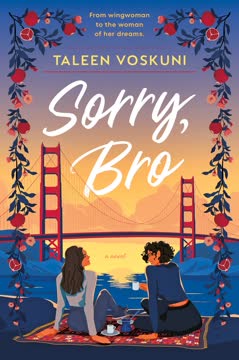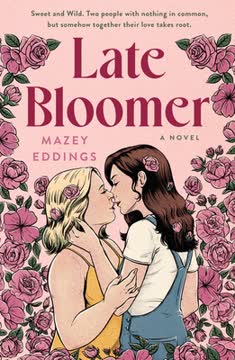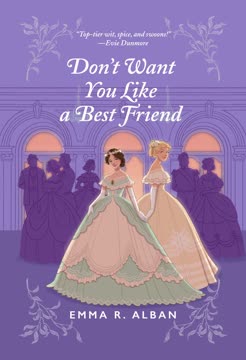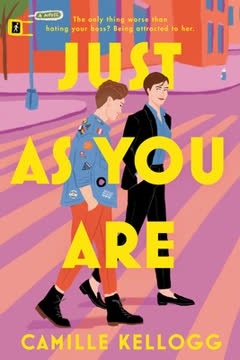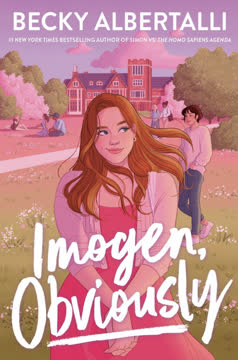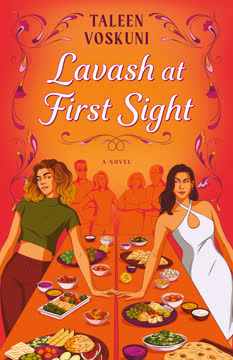Plot Summary
Red Dress, Wrong Proposal
Nareh Bedrossian, a 27-year-old Armenian American reporter in San Francisco, is swept into a public marriage proposal by her long-term boyfriend, Trevor, at a raucous German restaurant. The spectacle, complete with a camera crew and a massive diamond, leaves her overwhelmed and fainting. The moment crystallizes her doubts about their relationship, his understanding of her culture, and her own desires. Instead of joy, she feels suffocated by expectations—her family's, Trevor's, and her own. She asks for time to think, setting off a chain reaction that will upend her life.
Family Ties and Doubts
The next day, Nareh is thrust into the heart of her Armenian family, helping with her cousin Diana's bridal shower. Her mother, ever the matchmaker, is relieved when Nareh reveals she didn't say yes to Trevor. The family's opinions, especially her mother's subtle disapproval of Trevor's lack of cultural connection, weigh heavily. Nareh is caught between her father's American dreams and her mother's Armenian hopes, feeling the pull of both worlds. Her mother insists she attend Explore Armenia, a community event designed to connect young Armenians—especially for matchmaking.
Explore Armenia Beckons
Nareh, newly single and adrift, is cajoled into attending Explore Armenia's events. Her mother, energized by the prospect of finding her daughter an Armenian husband, creates a spreadsheet of eligible bachelors. Nareh, both amused and exasperated, agrees to attend a series of cultural events—dancing, cooking, and tastings—hoping to please her mother and perhaps find clarity about her own identity.
Shourchbar Night Encounters
At the Armenian line-dancing event, Nareh is anxious and out of place until she meets Erebuni Minassian, a striking, confident woman with a witchy vibe. Erebuni's warmth and ease draw Nareh in, and she's introduced to a new circle of Armenian friends: Vache, Janette, and Arek. The night is a blur of awkward introductions, cultural faux pas, and a growing attraction to Erebuni. For the first time, Nareh feels a sense of belonging—and a spark she can't ignore.
New Friends, Old Fears
As Nareh bonds with her new friends, she's torn between her mother's matchmaking mission and her own burgeoning feelings for Erebuni. The group's camaraderie is infectious, but Nareh's internalized fears about her sexuality and her family's expectations loom large. A flirtation with the community's most eligible bachelor, Raffi, only highlights her lack of interest in the men her mother champions.
Culture, Crushes, and Confessions
At a cooking class, Nareh's attraction to Erebuni intensifies, especially after learning Erebuni is queer. The revelation is both thrilling and terrifying. Nareh tries to drop hints about her own sexuality, but her fear of being outed keeps her guarded. Meanwhile, her mother's relentless matchmaking continues, and Nareh feels increasingly caught between two worlds—her family's expectations and her authentic self.
The Armenian Dating Spreadsheet
Nareh's mother's spreadsheet of eligible men becomes a symbol of the pressure to conform. Each candidate is vetted, but none spark genuine interest. The contrast between her mother's hopes and Nareh's reality grows starker, especially as her feelings for Erebuni deepen. The tension between duty and desire becomes unbearable, pushing Nareh toward a breaking point.
Cooking Class, Hidden Truths
During the cooking class, Nareh and Erebuni's connection grows, but so does the risk. A near-miss with Raffi, who asks Nareh out, and a clumsy attempt to come out to Erebuni leave Nareh reeling. The class becomes a microcosm of her struggle: the comfort of tradition, the thrill of new love, and the fear of exposure. When Nareh flees the event, Erebuni's gentle support hints at the possibility of something more.
Brandy, Banter, and Boundaries
At a brandy tasting, Nareh and Erebuni's flirtation reaches new heights. They navigate the minefield of family, friends, and community gossip, sharing private moments amid public scrutiny. The night culminates in an invitation to Erebuni's home, where vulnerability and desire finally break through. Their first kiss is electric, but the reality of secrecy and fear lingers.
Witchy Nights and First Kisses
In the sanctuary of Erebuni's cottage, surrounded by art and ritual, Nareh experiences a night of passion and connection unlike any before. The intimacy is transformative, but the next morning brings the weight of reality. Nareh is still closeted, and the prospect of coming out to her family is daunting. The joy of new love is shadowed by the fear of loss.
Rain, Ritual, and Realization
A solstice bonfire with Erebuni's coven becomes a turning point. Amid rain and ritual, Nareh symbolically burns her old self, shedding the expectations that have bound her. The experience is cathartic, but the fear of being outed remains. When a public display of affection at a family event leads to disaster, Nareh is forced to confront the consequences of living a double life.
Genocide, Ghosts, and Guilt
At a lecture on the Armenian genocide, Nareh witnesses the ongoing struggle for recognition and the pain of denial. Erebuni's activism and vulnerability inspire Nareh, but also highlight her own hesitance to take a stand—both in her work and her life. When her secret relationship is exposed at a banquet, Nareh's attempt to protect herself by lying devastates Erebuni, leading to a painful breakup.
Banquet, Betrayal, and Breaking
The fallout from the banquet is swift and brutal. Nareh's mother is devastated, and Erebuni feels betrayed by Nareh's lies. The relationship shatters, and Nareh is left alone, grappling with guilt and regret. Her attempts to return to the safety of her old life—her job, Trevor—only deepen her sense of loss and disconnection.
Fired for Telling Stories
At work, Nareh pitches a story about Armenian culture and is dismissed by her boss, who deems it irrelevant. When she secretly publishes a segment online, she's fired. The loss of her job, combined with the end of her relationship, leaves her at rock bottom. But with the support of friends and a viral essay about her experience, she begins to reclaim her voice and agency.
Out of the Closet
Inspired by her own writing and the support of her cousin Diana, Nareh comes out publicly as bisexual—first to her family, then to her thousands of Instagram followers. The act is both terrifying and liberating. Her mother, after initial shock, offers acceptance, and even her grandmother shares a story of a strong, unconventional woman from her past. The family's embrace gives Nareh the courage to hope for more.
Reconciliation and Renewal
With her truth now public, Nareh reaches out to Erebuni, who has been following her journey from afar. After a period of hurt and distance, Erebuni agrees to meet. In the lush sanctuary of the Conservatory of Flowers, they share their regrets, hopes, and love. Both changed by their experiences, they choose each other—openly and without reservation.
Dancing Toward the Future
At Diana's wedding, Nareh and Erebuni attend as a couple, embraced by family and friends. The journey from secrecy and shame to pride and joy is complete. Nareh's career finds new direction, her family finds new understanding, and her love with Erebuni flourishes. The story ends with dancing, hope, and the promise of a future built on honesty, courage, and connection.
Characters
Nareh Bedrossian
Nareh is a 27-year-old Armenian American reporter, caught between her family's traditional expectations and her own desires. Raised in a tight-knit diaspora community, she's always felt the pressure to be a "good Armenian girl" while also striving for American success. Her relationship with Trevor, a well-meaning but culturally oblivious boyfriend, represents safety and conformity. Nareh's journey is one of self-discovery—navigating the complexities of bicultural identity, bisexuality, and the courage to live authentically. Her psychological arc is marked by anxiety, people-pleasing, and a deep longing for acceptance, both from her family and herself. Through love, loss, and risk, she learns to claim her voice and her truth.
Erebuni Minassian
Erebuni is a striking, self-assured Armenian American woman, deeply connected to her heritage and her own queerness. A leader in the community, she organizes cultural events and lectures, blending activism with tradition. Her witchy aesthetic and artistic pursuits set her apart, but it's her emotional intelligence and empathy that draw people in. Erebuni's openness about her sexuality and her willingness to fight for justice inspire those around her. Her relationship with Nareh is both a catalyst and a mirror—challenging Nareh to be braver, while also confronting her own vulnerabilities and the pain of betrayal.
Anahid (Nareh's Mother)
Anahid is a classic Armenian mother—loving, meddling, and fiercely protective. Her life revolves around her daughter's happiness, which she equates with marriage and cultural continuity. She is both a source of comfort and pressure for Nareh, embodying the generational tensions of assimilation and tradition. Her journey is one of gradual acceptance, moving from fear and shame to support and pride in her daughter's authenticity.
Diana
Diana is Nareh's cousin and best friend, the golden child who does everything right—marrying an Armenian man, planning the perfect wedding, and embodying the family's hopes. She is supportive and loving, but her path also highlights the different choices available to women in their community. Diana's acceptance of Nareh's sexuality is a crucial turning point, offering a model of unconditional love.
Trevor
Trevor is Nareh's long-term boyfriend, a kind and stable presence who represents the "American dream" her father wanted for her. Despite his good intentions, he is oblivious to the nuances of Nareh's culture and needs. His public proposal and subsequent breakup force Nareh to confront what she truly wants. Trevor's inability to see beyond his own expectations ultimately makes him a symbol of the life Nareh must leave behind.
Vache
Vache is a food journalist and part of Erebuni's friend group. He is introspective, witty, and passionate about culture and identity. Vache becomes a confidant for Nareh, helping her process her experiences and supporting her writing. His own journey as a creative in the diaspora mirrors Nareh's struggles with belonging and self-expression.
Arek
Arek is an engineer and another member of the friend group. Outgoing and affable, he provides levity and warmth, quickly welcoming Nareh into the fold. His easy acceptance and genuine kindness help Nareh feel at home in the community.
Janette
Janette is an immigration lawyer with a reserved demeanor and a dry wit. She is part of the core friend group and offers a model of professional success and quiet strength. Her presence underscores the diversity and depth of the Armenian diaspora.
Nene (Grandmother)
Nene is Nareh's grandmother, a survivor and artist who carries the weight of history. Her stories and subtle encouragement provide Nareh with a sense of continuity and resilience. Nene's own regrets and memories serve as a reminder of the costs of conformity and the importance of living authentically.
Raffi
Raffi is the community's most eligible bachelor—a handsome, successful doctor who embodies the ideal Armenian son-in-law. His flirtation with Nareh is superficial, highlighting the emptiness of pursuing relationships for appearances rather than genuine connection.
Plot Devices
Dual Identity and Cultural Conflict
The novel's central device is the tension between Armenian tradition and American individualism. Nareh's journey is shaped by her attempts to reconcile these identities, with family, community, and romantic expectations pulling her in different directions. The pressure to marry within the culture, the weight of generational trauma, and the longing for acceptance drive the plot and character development.
Queer Romance as Self-Discovery
The romance between Nareh and Erebuni is both a love story and a vehicle for self-realization. Their relationship challenges Nareh to confront her fears, come out, and claim her truth. The secrecy, longing, and eventual public embrace mirror the broader journey from shame to pride.
Community Events as Crucibles
Explore Armenia's events—dances, cooking classes, tastings, lectures—serve as crucibles where personal and communal identities are tested and forged. These gatherings provide both the backdrop for romance and the stage for conflict, forcing Nareh to navigate visibility, gossip, and belonging.
Symbolism of Food, Ritual, and Art
Food, ritual, and art are recurring motifs, symbolizing both the comfort of heritage and the possibility of reinvention. Cooking classes, coffee readings, and witchy rituals become spaces for connection, confession, and transformation. The act of making and sharing food, in particular, is a metaphor for survival, resistance, and love.
Social Media and Public Voice
Nareh's journey is mediated through her roles as a reporter and influencer. The tension between curated self-presentation and authentic storytelling is explored through her work, her viral essay, and her coming-out post. The act of telling her story—publicly and honestly—becomes an act of liberation.
Foreshadowing and Parallelism
The novel uses Armenian proverbs, family stories, and generational echoes to foreshadow and parallel Nareh's journey. Her grandmother's regrets, her mother's fears, and her own choices are woven together, highlighting the cyclical nature of cultural and personal transformation.
Analysis
Sorry, Bro is a vibrant, heartfelt exploration of identity, belonging, and the courage to live authentically at the intersection of tradition and modernity. Through Nareh's journey, Taleen Voskuni deftly examines the complexities of bicultural life, the weight of family and community expectations, and the liberating power of queer love. The novel is as much about the Armenian diaspora's struggle to preserve and redefine itself as it is about one woman's quest for self-acceptance. Food, ritual, and storytelling are not just cultural markers but vehicles for healing and connection. The romance between Nareh and Erebuni is both a tender love story and a metaphor for the risks and rewards of embracing one's truth. Ultimately, the book argues that real happiness comes not from pleasing others or hiding behind tradition, but from the messy, brave work of being seen—by family, by community, and most importantly, by oneself.
Last updated:
FAQ
0. Synopsis & Basic Details
What is Sorry, Bro about?
- A Reporter's Identity Crisis: Sorry, Bro follows Nareh Bedrossian, a 27-year-old Armenian American reporter in San Francisco, whose life is upended after a disastrous public marriage proposal from her long-term, culturally oblivious boyfriend, Trevor. This event forces her to confront her deep-seated anxieties about her identity, career, and desires.
- Navigating Cultural Expectations: Pressured by her traditional Armenian mother to find a suitable Armenian husband, Nareh reluctantly dives into a series of community events, "Explore Armenia." These gatherings become a crucible for self-discovery, challenging her assumptions about love, family, and belonging.
- Unexpected Queer Romance: Amidst the matchmaking attempts and cultural immersion, Nareh finds herself drawn to Erebuni Minassian, a confident and enigmatic Armenian woman. Their burgeoning connection becomes a catalyst for Nareh to explore her bisexuality, confront her fears of coming out, and ultimately embrace an authentic life, even if it means defying expectations.
Why should I read Sorry, Bro?
- Rich Cultural Immersion: Readers seeking a vibrant, authentic portrayal of the Armenian diaspora will find themselves deeply immersed in Nareh's world, from traditional dances and cuisine to the complexities of generational trauma and cultural preservation. The novel offers a window into a community rarely seen in mainstream romance.
- Deeply Relatable Self-Discovery: Nareh's journey of self-acceptance, navigating family expectations, career dissatisfaction, and a hidden sexuality, resonates with anyone who has felt caught between different facets of their identity. Her internal monologue is witty, vulnerable, and profoundly human.
- Heartfelt Queer Romance: The slow-burn romance between Nareh and Erebuni is tender, passionate, and fraught with the challenges of coming out. Their connection is a powerful exploration of finding love that truly sees and celebrates one's whole self, making it a compelling read for fans of LGBTQ+ romance.
What is the background of Sorry, Bro?
- Armenian Diaspora in the Bay Area: The story is set within the Armenian American community of the San Francisco Bay Area, highlighting the unique experience of a diaspora striving to maintain its cultural heritage while integrating into American society. This setting informs everything from family dynamics to community events like "Explore Armenia."
- Generational Trauma and Identity: A significant cultural background element is the lingering impact of the Armenian Genocide. Erebuni's work at the Genocide Education Foundation and the lecture scene underscore the community's ongoing struggle for recognition and the importance of preserving history, which Nareh initially dismisses but later comes to understand.
- Intersection of Tradition and Modernity: The novel explores the tension between traditional Armenian values (e.g., family honor, arranged introductions, specific gender roles) and modern American ideals (e.g., individual choice, career ambition, LGBTQ+ acceptance). Nareh's internal conflict is a direct reflection of this cultural clash.
What are the most memorable quotes in Sorry, Bro?
- "Arrows, like words, once darted, do not return." (Armenian Proverb, Epigraph): This proverb, opening the book, powerfully foreshadows Nareh's impulsive words and actions, particularly her rejection of Trevor's proposal and her later lies, emphasizing the irreversible impact of spoken truths and untruths. It highlights the theme of communication and its consequences in Sorry, Bro analysis.
- "Our food stands for survival and is a stand against cultural erasure." (Vache, Chapter 9): This quote from Vache during the cooking class interview encapsulates a core theme of the novel: how cultural practices, especially food, are acts of resistance and preservation for the Armenian diaspora. It deeply impacts Nareh, shifting her perspective on her heritage and its significance.
- "You want everything and everyone, it seems. You can't play whatever side is most convenient at the moment." (Erebuni, Chapter 20): Delivered during their painful breakup, this line is a brutal but accurate assessment of Nareh's people-pleasing tendencies and her struggle to commit to her authentic self. It serves as a pivotal moment, forcing Nareh to confront her deepest psychological complexities and motivations.
What writing style, narrative choices, and literary techniques does Taleen Voskuni use?
- First-Person, Witty Narrative: Voskuni employs a first-person narrative from Nareh's perspective, characterized by a highly internal, often self-deprecating, and witty voice. This allows readers deep access to Nareh's anxieties, observations, and evolving emotional landscape, making her journey of self-discovery particularly intimate.
- Integration of Armenian Proverbs: Each chapter begins with an Armenian proverb, a distinctive literary device that foreshadows thematic elements, adds cultural depth, and provides a framework for Nareh's experiences. These proverbs often offer ironic commentary on the events that unfold, enriching the Sorry, Bro symbolism.
- Sensory and Emotional Detail: The author uses rich sensory details, especially around food, smells (like Erebuni's perfume), and physical sensations, to ground the reader in Nareh's experience and heighten emotional impact. This vivid imagery makes the cultural elements and romantic moments feel tangible and immersive.
1. Hidden Details & Subtle Connections
What are some minor details that add significant meaning?
- Trevor's "American Psycho" Hair: Nareh's initial description of Trevor's "precision American Psycho hair" (Chapter 1) is a subtle, dark foreshadowing of his underlying self-absorption and lack of emotional depth, contrasting sharply with Nareh's later realization that he's not the "teddy bear" she thought. This detail hints at the superficiality of their relationship.
- Nene's Proust Reading: Nareh's grandmother, Nene, is often seen reading Proust in the original French (e.g., Chapter 2), a detail that subtly highlights her intellectual depth and quiet rebellion against frivolous activities. This contrasts with the family's focus on social appearances and foreshadows Nene's later, surprisingly progressive insights into Nareh's choices and her own past regrets.
- The Keyhole Ornamentation on Nareh's House: The "unusual ornamentation—on the front face of the house, above the living room window, there's a keyhole surrounded by leaflike flourishes" (Chapter 14) is a subtle symbol of Nareh's own hidden self. It represents the secrets locked within her family home and within Nareh herself, waiting to be unlocked and revealed, connecting to her journey of coming out.
What are some subtle foreshadowing and callbacks?
- Nareh's "Girl Crushes": Early in the novel, Nareh dismisses her "girl crushes of days past" as never leading to anything (Chapter 6), a subtle callback to her unacknowledged bisexuality. This foreshadows her intense attraction to Erebuni and the eventual realization that these crushes were not just fleeting infatuations but a significant part of her identity.
- The "Snoozefest" Comment: Richard's dismissal of Armenian stories as a "snoozefest" (Chapter 8) is a direct callback to Nareh's own earlier, internalized prejudice against "Armenian stuff" (Chapter 3). This parallelism highlights Nareh's growth and the hypocrisy of her boss, as she later fights to tell these very stories, demonstrating a shift in her Nareh Bedrossian motivations.
- Nene's "First Love" Story: Nene's revelation about her "first love" being a poet she couldn't marry (Chapter 19) subtly foreshadows and validates Nareh's own struggle with choosing love over societal expectations. This generational echo provides a powerful callback to the sacrifices women in their family have made, giving Nareh courage to pursue her own path.
What are some unexpected character connections?
- Nareh's Father and Trevor's "American Dream": Nareh's father "fawned over Trevor" (Chapter 2), seeing him as the "all-American boy" he wished he could be. This connection reveals her father's own assimilationist desires and the pressure Nareh felt to fulfill his unlived dreams, making Trevor a symbol of a life Nareh was expected to lead, rather than one she chose.
- Kiki and the "Problem Person" Label: Kiki, the head of Explore Armenia, subtly disses Erebuni, implying she has "strange ideas" (Chapter 9). This unexpected antagonism between two prominent community members highlights the internal divisions within the diaspora, particularly around progressive views. It also foreshadows Nareh's own experience of being labeled a "problem person" at work for challenging norms.
- Nene's Connection to Musa Dagh Warrior Woman: Nene's story of the "fierce fighter from Musa Dagh" (Chapter 27) who never married because she wouldn't let a man be her boss, creates a powerful, unexpected connection to Erebuni. Nene explicitly states Erebuni reminds her of this warrior, elevating Erebuni beyond a romantic interest to a symbol of strength and independence within Nareh's family lineage.
Who are the most significant supporting characters?
- Nene (Nareh's Grandmother): Beyond her initial portrayal as a quiet, Proust-reading elder, Nene emerges as a profound source of wisdom and subtle rebellion. Her personal history of sacrificing love for family duty (Chapter 19) and her eventual, unequivocal acceptance of Nareh's sexuality (Chapter 27) provide crucial emotional and thematic depth, showing the evolution of tradition.
- Vache (Food Journalist Friend): Vache is not just a friendly face but a significant intellectual and emotional ally for Nareh. His articulate passion for Armenian food as "resistance" (Chapter 9) profoundly shifts Nareh's perspective on her heritage. Later, his editorial support for her essay (Chapter 23) is instrumental in her career pivot and her journey toward self-expression, highlighting Vache's influence on Nareh's career.
- MacKenzie (Work Ally): Initially presented as a "scary and self-absorbed" anchor (Chapter 10), MacKenzie unexpectedly becomes a fierce advocate for Nareh after her firing (Chapter 21). Her willingness to defy Richard and air Nareh's story reveals a hidden solidarity among women in the workplace, challenging Nareh's cynical view of her colleagues and providing a crucial turning point in her professional life.
2. Psychological, Emotional, & Relational Analysis
What are some unspoken motivations of the characters?
- Nareh's Fear of Disappointing Her Father: A deep, unspoken motivation for Nareh's initial adherence to a "straight" path and her career choices is her desire to please her deceased father. She recalls his pride in her "real news" reporting (Chapter 8) and his adoration for Trevor (Chapter 2), indicating a subconscious drive to fulfill his vision for her life, even after his death. This is a key aspect of Nareh Bedrossian motivations.
- Anahid's Matchmaking as a Coping Mechanism: Nareh's mother's relentless matchmaking and enthusiasm for "Explore Armenia" (Chapter 3) is subtly motivated by her own grief and sense of purposelessness after her husband's death. Nareh observes her mother's life "on pause" (Chapter 10), suggesting that finding Nareh a husband and grandchildren is a way for Anahid to regain a sense of control and meaning.
- Erebuni's Vulnerability Behind Her Confidence: Despite Erebuni's outward confidence and "slick coolness" (Chapter 19), her confession about being "a wreck" and missing Nareh (Chapter 29) reveals a deeper vulnerability. Her initial distance after the banquet was not just anger, but a protective measure against further hurt, indicating a fear of abandonment or betrayal stemming from past experiences.
What psychological complexities do the characters exhibit?
- Nareh's People-Pleasing and Self-Erasure: Nareh consistently prioritizes others' comfort and expectations over her own desires, leading to internal conflict and self-erasure. Her "white-lies-to-make-everyone-happy thing" (Chapter 6) and her inability to say "no" to her mother's demands highlight a deep-seated need for external validation, a core Nareh Bedrossian psychological complexity.
- Trevor's Unconscious Entitlement: Trevor, despite being portrayed as "sweet and smart and loyal" (Chapter 1), exhibits a subtle entitlement, particularly in his proposal and his assumption of Nareh's desires. His comment about Nareh "pining for him" while he's abroad (Chapter 1) and his casual "hookups" (Chapter 24) reveal a self-centeredness that Nareh only fully recognizes after their breakup.
- Anahid's Shifting Prejudice and Love: Anahid's initial discomfort with Nareh's sexuality (Chapter 23) is complex, rooted in cultural fears ("They are going to kill my daughter," Chapter 27) rather than pure bigotry. Her rapid shift to acceptance, driven by her love for Nareh and the desire for grandchildren, showcases a nuanced psychological journey where maternal love ultimately overrides ingrained societal anxieties.
What are the major emotional turning points?
- The Fainting at the Proposal: Nareh's physical collapse during Trevor's proposal (Chapter 1) is the initial, visceral emotional turning point. It's her body's undeniable rejection of a life she thought she wanted, signaling the profound disconnect between her outward persona and her inner truth, setting the stage for her entire journey of self-discovery.
- Erebuni's "Genocide Fatigue" Speech: Erebuni's passionate explanation of "genocide fatigue" and the ongoing struggle for recognition (Chapter 5) is a significant emotional turning point for Nareh. It shatters Nareh's dismissive attitude towards her heritage, sparking a newfound understanding and pride in her Armenian identity, which later fuels her career choices.
- Nareh's Public Instagram Post: Nareh's decision to publicly come out as bisexual on Instagram (Chapter 28) is a monumental emotional turning point. It represents her definitive break from secrecy and people-pleasing, a courageous act of self-acceptance that liberates her from years of internalized shame and fear, paving the way for reconciliation with Erebuni and her family.
How do relationship dynamics evolve?
- Nareh and Trevor: From Comfort to Constraint: Their relationship evolves from a comfortable, long-term partnership (Chapter 1) into a symbol of Nareh's unlived, inauthentic life. Trevor's inability to understand Nareh's cultural or personal needs ultimately transforms him from a "teddy bear" into a "vise" (Chapter 24), highlighting the suffocating nature of their dynamic.
- Nareh and Anahid: From Conflict to Compassion: The mother-daughter dynamic shifts from one of constant nagging and Nareh's resentment (Chapter 2) to a profound, if still imperfect, understanding. Anahid's initial shock and fear about Nareh's sexuality (Chapter 20) eventually give way to acceptance and pride (Chapter 27), demonstrating a powerful evolution rooted in unconditional maternal love.
- Nareh and Erebuni: From Spark to Shattered Trust to Solid Foundation: Their relationship begins with an undeniable spark and mutual attraction (Chapter 4), quickly deepening into intimacy (Chapter 13). However, Nareh's betrayal at the banquet (Chapter 20) shatters Erebuni's trust, leading to a painful breakup. Their eventual reconciliation (Chapter 29) is built on Nareh's honesty and courage, forging a stronger, more authentic foundation for their love.
3. Interpretation & Debate
Which parts of the story remain ambiguous or open-ended?
- The Full Extent of Nareh's Bisexuality Prior to Erebuni: While Nareh states she's "liked women, girls, for as long as I can remember" (Chapter 27) and had "hookups" in college (Chapter 7), the narrative leaves the depth and seriousness of these past experiences somewhat ambiguous. Readers might debate whether Nareh truly understood her bisexuality before Erebuni, or if Erebuni was the first to truly awaken that part of her.
- The Long-Term Impact of Nareh's Coming Out on the Wider Armenian Community: The story ends with Nareh's immediate family's acceptance and her friends' support, but the broader community's reaction is only hinted at through Tantig Sona's disdain (Epilogue). The novel leaves open the question of how Nareh and Erebuni's relationship will be received by the wider, more conservative elements of the Armenian diaspora, inviting Sorry, Bro discussion on societal change.
- The Future of Nareh's Career Path: While Nareh finds a promising new opportunity at Pom Media (Epilogue), the specific trajectory and challenges of this new venture are left open-ended. The narrative suggests a more fulfilling path aligned with her values, but the practicalities of building a new career, especially after being fired, remain an area for reader interpretation.
What are some debatable, controversial scenes or moments in Sorry, Bro?
- Nareh's Initial Dismissal of the Armenian Genocide: Nareh's early sentiment that Armenians are "so obsessed with the genocide" and that she's "already heard it all" (Chapter 3) is a controversial moment. This perspective, while reflecting a common sentiment among some younger diaspora members, can be seen as dismissive of profound historical trauma, sparking debate among readers about generational differences in processing heritage.
- Nareh's Lie to Her Mother About Erebuni at the Banquet: The scene where Nareh tells her mother that Erebuni "kissed her" and it was a "mistake" (Chapter 20) is highly debatable. While Nareh acts out of fear and a desire to protect her mother, this betrayal of Erebuni's trust and the implication of Erebuni as a "temptress" raises questions about Nareh's moral compromises and the cost of self-preservation.
- Richard's "No one knows who Armenians are" Comment: Richard's assertion that "No one knows who Armenians are, can't find the place on a map, and they don't care to anyway" (Chapter 8) is a controversial moment that highlights systemic prejudice and cultural erasure in media. This scene sparks debate about the responsibility of media outlets to represent diverse communities and the challenges faced by minority voices in mainstream platforms.
Sorry, Bro Ending Explained: How It Ends & What It Means
- Nareh's Full Embrace of Authenticity: The ending of Sorry, Bro sees Nareh fully embracing her authentic self. She has come out as bisexual to her family and publicly on Instagram (Chapter 28), broken off her engagement with Trevor for good (Chapter 24), and found a new career path aligned with her values at Pom Media (Epilogue). This signifies her liberation from external expectations and her commitment to living truthfully.
- Reconciliation and a Future with Erebuni: Nareh and Erebuni reconcile at the Conservatory of Flowers (Chapter 29), with Erebuni accepting Nareh's apologies and her commitment to honesty. They attend Diana's wedding as an openly recognized couple (Epilogue), symbolizing their acceptance within Nareh's family and community. The shared photo strip from the banquet, once a source of shame, becomes a cherished symbol of their journey and future together. This is the core of the Sorry, Bro ending explained.
- Redefining Family and Success: The ending redefines "success" for Nareh, moving beyond her father's American dream or her mother's traditional matchmaking. Her mother's acceptance, Nene's blessing for [Nareh](#nareh
Review Summary
Sorry, Bro received mixed reviews, with praise for its representation of Armenian culture and exploration of identity. Readers appreciated the humor, cultural insights, and portrayal of coming out later in life. However, some found the pacing uneven and the main character's decisions frustrating. The romance was described as sweet but underdeveloped. Overall, reviewers commended the author's love for her heritage shining through, despite some criticisms of plot and character development.
Similar Books
Download PDF
Download EPUB
.epub digital book format is ideal for reading ebooks on phones, tablets, and e-readers.
